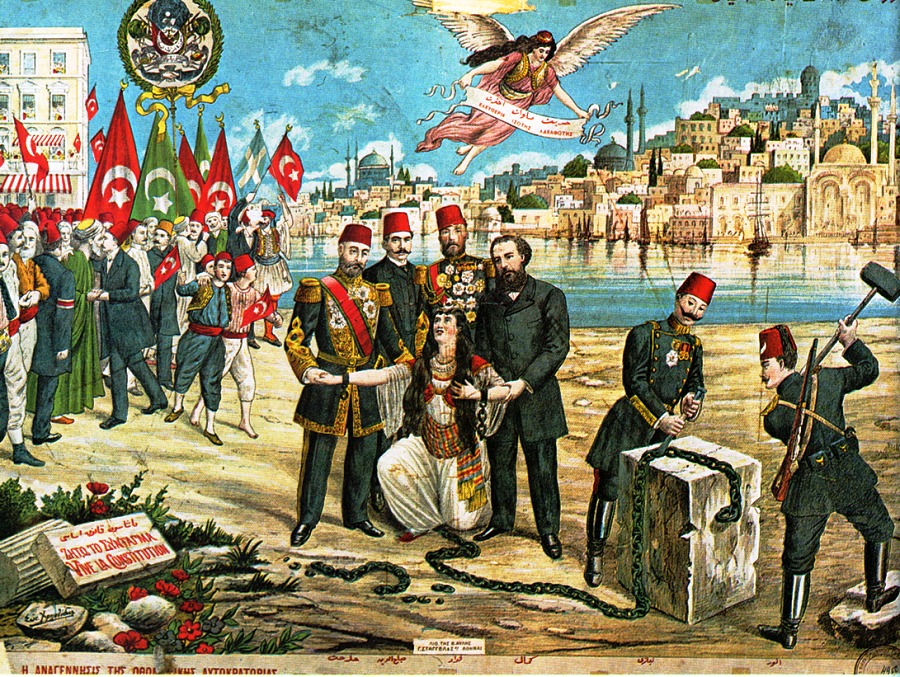The Sultan ordered troops from Smyrna to support those in Salonica who were believed not to have joined the revolt.
Continuing The Turkish Revolution of 1908,
with a selection from Turkey in Revolution by Edwin Pears. This selection is presented in 5 easy 5-minute installments. For works benefiting from the latest research see the “More information” section at the bottom of these pages.
Previously in The Turkish Revolution of 1908.
Time: 1908
Place: Istanbul

Public domain image from Wikipedia.
His administration was accepted with astonishing rapidity. The peasants paid their taxes to him. The Bulgarian bands expressed their sympathy and stayed their hands until they saw what would be the result of this revolt. The Turkish troops for a time also hesitated. On the 15th July Niazi was informed that five regiments sympathized with his movement. Then the Bulgarian bands hesitated no longer
During eight months the committee had been pursuing its work secretly and thoroughly, not only in Macedonia but in Constantinople and other large cities, Turkish women always aiding. Though there were female spies, yet the manner of life of Turkish ladies offers many facilities for carrying messages safely which are not at hand for men, and neither spies nor ordinary police agents dare search Turkish women. The precise nature of the intended movement was probably unknown to all but three or four of the leaders of the committee. Meantime the Sultan had learned of the growth of the movement directed from Paris but had been unable to check it or to learn what were its ramifications. He was informed daily of the development of the movement and took measures to crush it. On the 19th of July eight hundred soldiers arrived at Monastir. Shemshi Pasha, with two battalions, went there also from Uskub. His troops refused to fire on their Muslim brethren. Shemshi himself, as he was about to start for Resna, was shot. This was followed on the 20th by the killing of the colonel-in-command at Seres. Macedonia had practically declared for the abolition of the existing régime, and the province had, as by magic, accepted the dictatorship of the representatives of the committee. Greek bands had been notified that they would no longer be tolerated, and their bishops were informed that they would be held personally responsible if more outrages were committed by their coreligionists.
As reports poured into the capital of the revolt in Monastir, in Salonica, and of disaffection even in Adrianople, the Sultan became more and more alarmed. He had invited Ferid Pasha, the then Grand Vizier, in the early days of July to communicate with the heads of the army and take measures to punish the discontented. Ferid pointed out that this was not the business of the Grand Vizier, but of the Minister of War. To those who know Turkish history the reply will appear natural. Under ordinary circumstances military officers would consider such a slight to their Seraskeir as one inflicted upon themselves. Thereupon the Sultan, instead of leaving the matter to his Minister of War, took it into his own hands. If there is one institution in which he has had confidence in and then to set others to spy upon them has been his great panacea against all political troubles. He ordered some forty spies to report upon the conduct of the troops, and, of course, to send the names of those officers whose loyalty to him was doubtful. The mission of these men at once became known and was resented by the whole body of the officers. It was the spark applied to the powder. Men who had hesitated to join the disaffected party now saw their safety in throwing in their lot with those who were demanding reforms. I am assured that up to this time the word “Constitution” had not been mentioned. The soldiers, however, now telegraphed to the Palace their demand for reforms and for the assembling of a Chamber of Deputies. Abdul Hamid soon learned that this demand was backed by nearly the whole of the Third Army Corps, that is, by all the troops in Macedonia. The Sultan ordered troops from Smyrna to support those in Salonica who were believed not to have joined the revolt. The two bodies, those in Salonica and those on their way from Smyrna, were to attack the Monastir troops.
Before giving the order to march, however, the Sultan, according to Moslem custom, required the sanction of the Sacred Law of the Sheri. He was proposing to send Moslems to fight Moslems, and against that the restrictions of the Sheriat or Sacred Law are specially strict. Application, therefore, was formally made to the Fetva Eminé, that is, to the head of the Court of the Sacred Law charged with the issue of Fetvas. These documents are decisions and the manner of obtaining them recalls to those familiar with Roman Law the responsa prudentum, “the answers of the learned in law” of the Romans, from whom the practice of obtaining them was adopted. They are authoritative, are carefully treasured up, and form precedents for future use. The question was put in the usual form: “Is war justifiable against Muslim soldiers who rebel against the sovereign’s authority?” But the demands of the discontented and a statement of facts had to be produced in order that the question might be answered.
| <—Previous | Master List | Next—> |
Edwin Pears begins here. A. Rustem Bey begins here. Arminius Vambery begins here.
More information here and here, and below.
Leave a Reply
You must be logged in to post a comment.